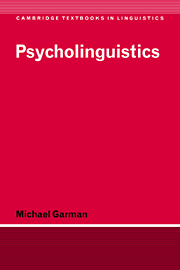Book contents
- Frontmatter
- Contents
- List of illustrations
- List of tables
- Preface
- Acknowledgements
- List of abbreviations
- PART 1 Elements of psycholinguistics
- PART 2 Processes and models
- 4 Processing the language signal
- 5 Accessing the mental lexicon
- 6 Understanding utterances
- 7 Producing utterances
- 8 Impairment of processing
- References
- Index of names
- Subject index
8 - Impairment of processing
from PART 2 - Processes and models
Published online by Cambridge University Press: 05 June 2012
- Frontmatter
- Contents
- List of illustrations
- List of tables
- Preface
- Acknowledgements
- List of abbreviations
- PART 1 Elements of psycholinguistics
- PART 2 Processes and models
- 4 Processing the language signal
- 5 Accessing the mental lexicon
- 6 Understanding utterances
- 7 Producing utterances
- 8 Impairment of processing
- References
- Index of names
- Subject index
Summary
Introduction
The preceding chapters have attempted to survey language functions in the individual, including the more peripheral structures and processes as well as the more central ones. In this chapter we shall be asking in what ways this spectrum of functions may be impaired as a result of damage to the neurophysiological substrate. This takes us into the field of aphasia research, or aphasiology. Because language is a complex of functions, its manifestations of impairment are not all the same, leading to a situation which some authorities characterise as different types of aphasia, and which others see rather as different forms of a single condition.
As distinct from the study of normally occurring, transient errors, we are dealing here with long-term, systematic impairments, though to some extent there may be change in certain of their characteristics over time, as a result of spontaneous recovery, or specific treatment, or both together. Naturally, enough, since we are dealing with linguistic consequences of damage to bodily tissue, medical influence in this field has been traditionally strong. Moreover, issues in this field have proved very complex, with problems in diagnosis and interpretation. This is perhaps what should be expected, given the already complex nature of normal language-processing. As a result, students have often found the field a difficult one to approach for the first time. Medically trained students find the linguistic terminology just as difficult as those from a linguistic background find the medical terms;
- Type
- Chapter
- Information
- Psycholinguistics , pp. 416 - 471Publisher: Cambridge University PressPrint publication year: 1990

